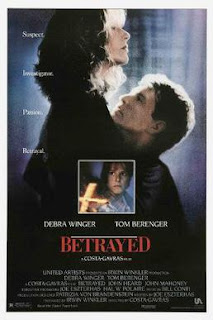Monday, April 1, 2019
QUICK THOUGHTS ON SPIKE LEE'S BLACKKLANSMAN
The above image is the cleverest thing to have come out of the 2018 BLACKKLANSMAN, partly because of the juxtaposition of the threatening-looking hair comb with the Klan hood.
Prior to viewing this Oscar nominee, I'd heard that BK was something of a return to form for Lee, whose 1989 DO THE RIGHT THING remains a major cinematic work despite its agitprop politics. I confess that as a white guy I grew tired of seeing white people portrayed as either active racists or naive fools (more or less aligned with the two Italian brothers in RIGHT THING). Consequently I'd given all Lee films a pass since 1994's CROOKLYN. Thus I can't speak to whether any of the films in between CROOKLYN and BK showed any improvement in his ability to characterize white people. However, since there's no improvement in BK whatever, I tend to doubt it.
True, the script for BK, based on a real-life book by former black police officer Ron Stallworth, was concocted without Lee's direct input, so those writers may be partly responsible for any and all fatuities of characterization-- which, in fact, include all of the black people as well. All of the characters are thinly drawn: the fictionalized version of Stallworth, a Colorado Springs cop who initiates contact with local Klan members, his girlfriend, the cops he works with, and the Klan-dolts being investigated. It doesn't really matter that the goons of the Klan are portrayed as cretins, since their belief-system justifies cartoonish treatment. But when the film has Stallworth and his girlfriend argue about the role of cops in relation to Black American culture, and Stallworth can't justify his profession beyond the fact that he always wanted to be a policeman, I think I'm justified in suspecting that none of the authors really cared anything but putting across the ideology.
And what is the ideology? Well, it comes down to the ideal of Nietzschean ressentiment, which has become almost the only ideology of the American Left today. Going on the assumption that, given his still considerable clout, Lee probably reworked everything in the script to suit his ideology, he has but one message that he tiresomely reiterates in most if not all of his movies: White People Have Done Black People Evil in the Past and They Will Keep Doing So, Unless Stopped Somehow. No individual evil springs from any historical contingency: the resurgence of the KKK following the success of Griffith's 1915 film BIRTH OF A NATION is one with the 2016 election of Donald Trump, and even with the negative depiction of Black Africans in TARZAN movies.
But while Lee has much to say about the ways black people have been persecuted, his depiction of the Klan's harassment of Jews is underwhelming. Though the Klan-members do spout a lot of anti-Jewish sentiments, there's no attempt to glean what activities the Klan undertakes against the Jews of Colorado Springs. Only the Klan's activities against the city's blacks are depicted. Lee and his collaborators try to hoax reviewers into thinking that he has some concern for Jews. A real-life character from Stallworth's book, whose name and ethnicity are not revealed beyond the bare fact of his being white (so that he can infiltrate the Klan using Stallworth's name), is made into a Jewish-American white guy named Zimmerman. However, I'm tempted to believe that the only reason he's Jewish is so that Lee and Co. could avoid the trope of "black and white cop fighting racism together." If Zimmerman is, in the view of the Klan, " non-white," then the alliance can be read as two non-whites battling against the "white devils," and so the anti-white ideology remains intact. Zimmerman only gets one character-moment, when he considers resigning from the operation. This gives the Stallworth character the chance to chide his fellow cop not just for his unprofessional reluctance, but also for the real sin Jews commit in the eyes of radical black activists: the sin of being able to "pass" by concealing the fact of Jewish difference. Stallworth even references "light-skinned" blacks who have chosen to pass, implying that this is a betrayal of The Cause. Not surprisingly, Zimmerman utters no more protests for the rest of the film.
Lee was at his most honest about his true feelings in a MALCOLM X scene. A young white girl approaches Malcolm during the latter's years of political celebrity, and asks what can someone do about the sins of whites against blacks, only to be told, "There's nothing you can do." No enormities against any people in history-- not Jews, nor Native Americans, not even Black Africans-- outweigh the sins against Black Americans, and Lee is entirely mendacious when he pretends otherwise. Lee neither wants nor thinks feasible any rapprochement between the races such as MLK imagined. He stokes resentment to no end except encouraging black rage and white guilt, which combination he must think will work to the benefit of Black People. For him, the rise of Trump can only signify that the White Devils have not yet been made guilty enough. Lee would never consider the possibility that Trump might be the result of a little too much white guilt.
Though a minor film, BK is at least coherent in its single-minded ideology, which puts it miles ahead of the odious THREE BILLBOARDS OUTSIDE EBBING, MISSOURI. But in terms of dramatic development, it's not even as good as Costa-Gavras's film on a similar theme, the 1988 BETRAYED.
Subscribe to:
Post Comments (Atom)



No comments:
Post a Comment